A Year in TV Guide explores the 1964-1965 television season through the pages of TV Guide magazine. Each week, I’ll examine the issue of TV Guide published exactly 50 years earlier. The intent is not simply to examine what was on television each week but rather what was being written about television.
Week #40
June 19th, 1965
Vol. 13, No. 25, Issue #638
Western New England Edition
On the Cover: Richard Basehart and David Hedison (photograph by Ivan Nagy).
The Magazine
I didn’t have high hopes for this week’s cover article about Richard Basehart, star of ABC’s Voyage to the Bottom of the Sea. I worried it would be another typical TV Guide profile with the added bonus of Basehart complaining about being stuck on television. I was very wrong. Marian Dern did briefly discuss his early work and the trajectory of his acting career but the bulk of the three-page article was focused on the here and now. As for Basehart, he’s fine with working in TV for the moment but does hope to eventually play King Lear and other more substantial theatrical roles. He came right out and said “nothing irritates me more than actors who take all the money and then complain about how terribly limited TV is. That kind of talk only reflects on them.”
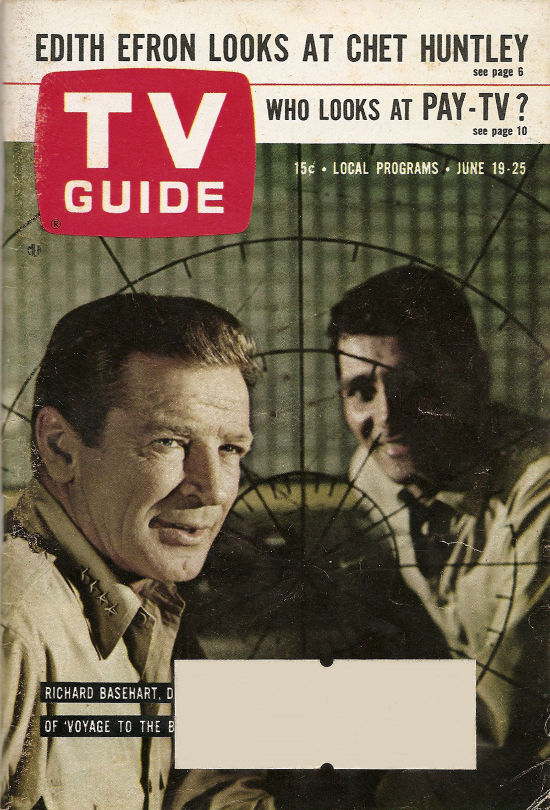
Front Cover – Copyright 1965 Triangle Publications, Inc.
According to Irwin Allen, producer of Voyage to the Bottom of the Sea, Basehart was chosen for the role of Admiral Nelson “because he’s a consummate actor” who “could make all the derring-do believable.” It’s not unusual for Basehart to put in 14-hour days, carrying the bulk of the show’s scripts on his shoulders alongside his younger co-star David Hedison. The scripts may not be Shakespeare but Basehart makes the best of them:
With Shakespeare, there’s more character than an actor can ever plumb. But there’s no greater challenge than making something out of nothing. I mean, you take an undeveloped character and you have to make him alive. You take what’s there, and you round him out. You see, the lack of time sharpens an actor’s tools to razor-sharp edges. There’s no time to study. You’re on, and it’s up to you to create the man, the mood, instantly.
Basehart worries about his hectic schedule, which also includes narrating television specials on weekends, but hopes to only have to put up with it for a few more years before he can move on. He might also be worried about his health in light of the death of his good friend John Larkin (co-star of 12 O’clock High) in January. “I had an intensely personal reaction to his death,” Basehart explains. “I resented his death. He was just beginning to garner the fruits of his efforts … and boom.”
“The Travels of Chester Huntley” by Edith Efron is a two-and-a-half page profile of the famous NBC newsman, half of The Huntley-Brinkley Report. He was raised on a massive farm in Montana where he dreamed of seeing the world. He did and still is, thanks to the “gift for writing and extemporaneous speaking” he developed during college. Huntley and Brinkley are two of the most famous men in the country, described as “glum” and “twinkley” in a song by by Frank Sinatra and Milton Berle. Huntley isn’t glum, however. He takes his job seriously. Says Brinkley: “He cares. He feels a sense of involvement in the news. Sometimes you can see he’s personally affronted by the news.”
In person, according to Efron, Huntley is not glum at all. He loves his profession. “It takes you everywhere sooner or later. It gives you an opportunity to use, as your basic tool, the incredible English language. And it comes nearer to satisfying an insatiable curiosity than anything I know.” He considers himself a personal journalist, worries about the future of the nation’s two-party system, has strong feelings about the state of conservatism, doesn’t want to be a celebrity or sign autographs, has a lyrical side that rarely comes out, owns a farm in New Jersey that got him into hot water with NBC because he had his name on beef, and would like to run for Congress eventually to help “play some role in rationalizing the whole dilemma of U.S. agriculture.” [He didn’t.]
Neil Hickey’s examination of the state of pay-TV (also known as “feevee,” “tollvision,” and “pay-see” by champions and detractors) is of particular interest because the only remaining pay-TV system in operation is the RKO General/Zenith Radio Corporation Phonevision experiment in Hartford, CT over WHCT-TV (Channel 18). Two other pay-TV systems have folded in the past year: Subscription Television, Inc. (Los Angeles and San Francisco) and Telemeter (Etobicoke, a suburb of Toronto). An anonymous network hired a market research company called Oxtoby-Smith to compile an exhaustive report on pay-TV. It concluded “that the whole idea of tollvision was a bad one in the first place, that pay-TV as a going business was wishful thinking at best and destined for doom by its very nature.”
The study was conducted in the fall of 1963. It included 10,000 phone interviews in Hartford, in-depth interviews with 400 subscribers, 200 non-subscribers, and 120 former subscribers. Overall, after examining all three systems then in existence, the study determined that to be successful a pay-TV system would have to see subscribing households spending between $125 and $175 a year. None came close. Furthermore, the theory that pay-TV would bring culture to the public that network television couldn’t or wouldn’t provide turned out to be false. Subscribers only wanted to watch movies and sporting events.
In response to the study, RKO General’s John Pinto, in charge of the Phonevision experiment in Hartford, stated “I have no argument at all with the facts, which seem very accurate. I take violent exception, however, to some of the interpretations.” He argued that Phonevision could be successful if 10 percent of households in Hartford subscribed and spent $65 a year. It currently has 5,000 subscribers but would need to reach 15,000 to 20,000 to break even. He admits that it is disappointing that subscribers aren’t interested in the “wide range of culture” it has offered. Zenith president Joseph S. Wright is very bullish on Phonevision and pay-TV, and the company is petitioning the FCC to authorize nationwide subscription TV “so that the American public in the free-enterprise marketplace, can decide for itself whether it wants this new TV service.”
Pamela Mason is the “Queen of the Loose-Lips” according to Dwight Whitney, who sat down with the former wife of actor James Mason for what must have been a bizarre chat. She hosts a syndicated weekday talk show (The Pamela Mason Show) on which she discusses a wide-range of topics she freely admits she knows nothing about. She is in a feud with Hedda Hopper, hates Richard Blackwell, is opposed to mail-order guns, is irritated with divorce laws, is scared she’ll get married again, doesn’t understand art, and isn’t at all political. She is, however, very opinionated. “I’m always in trouble,” she explains. “I don’t believe in pussyfooting around. It’s better to have everything exposed than to be afraid it will come up later and hit you.”
The final article in this issue is the second half of Allan Sherman’s look back at his time working on I’ve Got a Secret. Like the first part, published last week, Sherman adapted the article from his upcoming autobiography to be published later in the summer. Working for Mark Goodson and Bill Todman, the heads of Goodson-Todman Productions, was difficult for Sherman because he “was a Disorganization Man, playing a lonesome off-key melody in the Goodson-Todman Symphony of Organization.” He describes the personalities of Goodson and Todman and how he reacted to them. Goodson liked to ask questions in ways that made them impossible to answer, something Sherman tried once with his wife (it made her cry).
Goodson also knew how to play the Madison Avenue Game, which involved getting rid of anyone in your way as you try to grow more and more powerful. Rather than fire them, however, you get them to quit. Goodson tried that once with Frank Satenstein, director of I’ve Got a Secret and The Jackie Gleason Show. Sherman points out that Goodson had nothing against Satenstein personally, he just wanted to replace him with a cheaper staff director. Sherman called Satenstein prior to a lunch meeting and told him what Goodson was planning. By agreeing enthusiastically to all of Goodson’s insane demands, Satenstein was able to keep his job.
Sherman finally left I’ve Got a Secret in 1958 after he was offered a 13-week contract (rather than his usual one-year contract) only if he agreed not to work on other shows. Worried that he was unwittingly playing the Madison Avenue Game, Sherman refused and left. He spent the next four years sneaking around television “too embarrassed and ashamed” to talk to anyone from Goodson-Todman. Years later, after skyrocketing to fame with his first comedy album (My Son, the Folk Singer), he finally ran into Goodson while performing at Carnegie Hall. Goodson called him a genius, shook his hand, and referred to him “disorganized as hell.”
The “As We See It” editorial this week argues that airplane movies are the absolute worst because you can’t escape them plus, in TV Guide‘s experience, they are always John Wayne films. And John Wayne belongs on the big screen. “Television prime time really isn’t for movies either, except that the networks make a lot of money selling participation spots to advertisers, and use up a lot of time they’d have to think up programs for and gable that they’d attract an audience.”
Cleveland Amory reviews Bonanza this week, which is reportedly shown in 58 countries. Some of these foreign versions were shown on an episode of The Jack Paar Show and according Amory they were terrific and he suggests having all Westerns shipped to other countries and then sent back to the United States in other languages as Easterns. He’s concerned about Bonanza‘s recent shift towards “symbolic, psychological drama,” preferring the show when it was “more Western and less Freudian.” He is also critical of its weak minor characters and weak female characters. On the other hand, Lorne Greene “is fine” and Dan Blocker “always good.”
News from the Hollywood and New York TV Teletype columns:
- ABC will air three David Wolper specials next season: “The Teen-Age Revolution,” “Mayhem on a Sunday Afternoon,” and “In Search of Man.”
- The CBS News and Special Broadcasts Division will present at least 10 specials next season, including “The Volga” and “State of the Union.”
- Filmways is working on a potential comedy-adventure series called The Master Spy for ABC’s 1966-1967 schedule.
- CBS begins broadcasting pre-season NFL football games on August 7th. NBC’s AFL football coverage starts August 8th.
- CBS has a camera crew following Frank Sinatra for a planned documentary about the famous singer.
- McHale’s Navy will be set in an Italian town next season.
- Alejandro Rey has been cast as Dick Crenna’s assistant on Slattery’s People next season. Also joining the cast: Kathie Browne and Francine York.
- Marlyn Mason will appear in two additional episodes of Ben Casey after the first five episodes of the season.
- Elaine Stritch will play Peter Falk’s secretary in The Trials of O’Brien.
- Jeannine Riley has announced she is leaving Petticoat Junction.
- NBC has The Ghostbreaker with Kerwin Mathews, Diana Van Der Vlis, and Norman Fell waiting in the wings as a mid-season replacement. [The series never materialized but NBC aired the unsold pilot in September 1967.]
Rounding out the national section is a picture feature showcasing Steve Allen’s use of “slant boards” he feels help him relax and clear his head. There is also the regular TV crossword puzzle which someone actually filled out.
There are three news reports in the “For the Record” column in the listings section this week:
- Although television coverage of the Gemini IV space flight may have initially been underwhelming due to the fact that Jim McDivitt and Ed White were too far out for TV cameras, it ended gloriously. Film footage of Ed White floating in space was thrilling and lucky viewers who saw it in color were “doubly thrilled.” White and McDivitt enjoyed watching the footage themselves, with White even jumping out of his chair aboard the USS Wasp aircraft carrier at one point.
- The Supreme Court ruled 5-4 that televising criminal cases violates “the time-honored principles of a fair trial.” Judges will likely cut back on the use of TV cameras in cases that have “the slightest tinge of sensationalism.” It is unlikely, however, that the matter has been settled for good.
- International Telemeter Corp. is supporting RKO General and Zenith in their petition to the FCC to authorize pay-TV nationwide.
The letters page included eight letters this week. Two praised NBC’s June 1st special on the Grand Canyon:
My thanks to NBC for the Grand Canyon “Journey with Joseph Wood Krutch.” The eloquence of Krutch’s words and the visual persuasiveness of the land itself underscored an important point–the wilderness now, as never before, must be preserved.
Mike Jelf
Lomita, Cal.It was a most delightful hour. We need more programs of this nature, not only to give us a glimpse of the great beauty in our country, but also as a reminder that we must work to preserve it.
Mrs. Robert Sherman
DuBois, Pa.
There were also two letters from viewers who watched “The National Drivers Test” on CBS on May 24th:
A-plus to CBS on its “National Drivers Test.” The questions were not tricky or overly technical. Anyone scoring poorly should take a long hard look at his driving before getting behind the wheel again.
Constance Murray
Franklin, Pa.I took part in the test, scored 49, and it gave me something to think about. I’ll certainly be more careful in the future.
Donald Webb Jr.
Wormleysburg, Pa.
Other letters: outrage that the Navy and Marines support “such mockery” as McHale’s Navy and Gomer Pyle, U.S.M.C.; a reader depressed by TV Guide‘s “Ten Years Ago This Week” feature because it reminds her of the days of live plays on TV and soap operas only in daytime; praise for Art Buchwald’s June 5th article about The Fugitive; and appreciation for the way CBS used flashing announcements at the bottom of the screen while covering the Gemini IV space flight rather than interrupting programs.
The TV Listings
[We’re back to the Western New England edition (Connecticut and Massachusetts) of TV Guide this week rather than the Eastern New England edition (Massachusetts, Rhode Island, New Hampshire, Connecticut).]
The weekend was busy for the networks. On Saturday, June 19th at 10:30AM, ABC aired an hour of live coverage of the Le Mans Grand Prix race via Early Bird. The network’s regular 2PM afternoon baseball game saw the Chicago Cubs face off against the Cincinnati Reds. At 4:30PM, NBC aired live coverage of the third round of the U.S. Open Golf Tournament from Bellerive Country Club in St. Louis. Commentary was provided by Jim Simpson, Bud Palmer, Bill Mazer, and Paul Christman. More coverage of the Le Mans Grand Prix was scheduled during ABC’s World of Sports from 5-6:30PM but only if Early Bird was available.
Al Hirt’s Fanfare made its debut on CBS at 7:30PM. The hour-long variety show was a summer replacement for Jackie Gleason and His American Scene Magazine. Guests for the first episode included Eydie Gorme, Shari Lewis, Carole Reinhardt, Leonard Rose, and Eddie Rambeau. The Don McKayle dancers and Mort Lindsay’s orchestra were the regulars.
ABC aired another hour of live coverage of the Le Mans Grand Prix race via Early Bird on Sunday, June 20th at 10:30AM. Included was the conclusion of the race. At 4:30PM, NBC aired live coverage of the final four holes of the U.S. Open. CBS aired Part 2 of “The Hollow Crown” from 9-10PM, following the English monarchy from King Charles II to Queen Victoria. Dramatized readings by members of the Royal Shakespeare Company were based on historical letters, memoirs, and speeches. Part 1 aired on February 16th.
On Monday, June 21st at 8:30PM, CBS aired the last episode of The Andy Griffith Show for the season. Next week Summer Playhouse will take over the time slot. At 9:30PM, repeats of The Farmer’s Daughter moved from Fridays at 8PM to replace cancelled The Bing Crosby Show, part of ABC’s reshuffling of its schedule for the summer. CBS premiered Hollywood Talent Scouts at 8:30PM on Tuesday, June 22nd as a summer replacement for The Red Skelton Show. Hosted by Art Linkletter, the hour-long talent show featured Eartha Kitt, Liberace, and Jonathan Winters as scouts, with Debbie Reynolds as a guest. The final repeat of The Danny Kaye Show for the season aired from 10-11PM on Wednesday, June 23rd on CBS. Next week repeats of The Lucy-Desi Comedy Hour will move into the time slot for the summer.
At 2PM on Friday, June 25th ABC aired the final episode of its soap opera A Flame on the Wind, to be replaced on Monday, June 28th by Where the Action Is. At 2:30PM, the final episode of Day in Court aired. It will be replaced on Monday by A Time for Us, a new soap opera. [Actually a revamped version of A Flame on the Wind.] In prime time on Friday the ABC summer reshuffle continued with FDR moving from 9:30PM to 8:00PM to replace The Farmer’s Daughter. At 9:30PM, the third weekly installment of Peyton Place debuted. On CBS, Vacation Playhouse returned at 9:30PM as a summer replacement for Gomer Pyle, U.S.M.C.. The series consisted of unsold pilots. This week’s installment was “Sybil,” staring Suzy Parker as a vain nymph banished to do good deeds on Earth.
Here are the TV Guide close-ups for the week:
- Special: Harvard-Yale Regatta (WTIC-TV/WBZ-TV, Saturday at 7:00PM)
- Special: Le Mans Grand Prix (ABC, Sunday at 10:30AM)
- Special: U.S. Open (NBC, Sunday at 4:30PM)
- Special: The Hollow Crown, Part 2 (CBS, Sunday at 9:00PM)
- Movie: Judgement at Nuremberg (ABC, Sunday at 9:00PM, Repeat)
- Hollywood Talent Scouts (CBS, Tuesday at 8:30PM, Debut)
- 12 O’clock High – “To Heinie, With Love” (ABC, Friday at 10:00PM, Repeat)
Here are some of the programs available for purchase by subscribers to Zenith Radio Company’s Phonevision pay television experiment on Connecticut’s WHCT-TV (Channel 18):
- Movie: The Truth About Spring (Saturday at 8:00PM, $1.25)
- Movie: The Rounders (Sunday at 9:00PM, $1.25)
- Movie: Signpost to Murder (Monday at 9:00PM, $1.00)
- Movie: That Man from Rio (Tuesday at 9:00PM, $1.25)
- Special: The Trojan Women (Friday at 9:30PM, $1.50)
Locally it was a busy weekend as well. On Saturday at 1:25PM, WNHC-TV (Channel 8) aired a half-hour color special about the 1962-1963 Nassau Speed Week narrated by Les Keiter. At 1:55PM, the station aired a baseball game between the Minnesota Twins and the New York Yankees, pre-empting ABC’s Saturday game. At 2:15PM, another baseball game between the Boston Red Sox and the Chciago White Sox was seen on WHDH-TV (Channel 5), WWLP (Channel 22), WHNB-TV (Channels 30 and 79), and WRLP (Channel 32). A fourth baseball game started at 3:55PM on WHCT-TV (Channel 18), this one between the New York Mets and the San Francisco Giants. At 5PM, WTIC-TV (Channel 3) aired coverage of the Bowling Green Handicap Horse Race. WHDH-TV carried the same coverage at 5:30PM.
At 7PM, both WTIC-TV in Connecticut and WBZ-TV (Channel 4) in Massachusetts aired the 100th Harvard-Yale Regatta, held on the Thames River in New London, CT. Seven cameras covered the four-mile race. WTIC-TV pre-empted the first half of Fanfare on CBS, picking up the variety show in progress at 8:30PM. Here’s a WTIC-TV advertisement for the race:
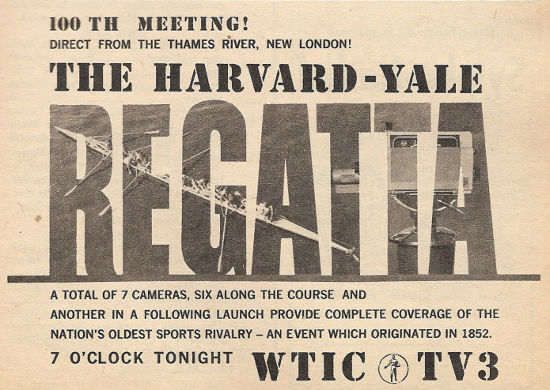
Advertisement for the 100th Harvard-Yale Regatta on WTIC-TV (Channel 3) – Copyright 1965 Triangle Publications, Inc.
At 8:30PM, WBZ-TV pre-empted NBC’s Mr. Magoo for a half-hour syndicated color special titled “Paintings in the White House” hosted by Lady Bird Johnson.
On Sunday at 12:55PM, WNHC-TV carried a second baseball game between the Twins and the Yankees. At 1PM, WATR-TV (Channel 20) kicked off a four-and-a-half hour live broadcast of the Waterbury, CT soap box derby. Some 180 youngsters from the area competed. Commentators included Jim Sullivan, Paul Chamberlain, and Jerry Fischer. Also making appearances were local civic and political leaders plus TV celebrities. WHCT-TV aired another Mets-Dodgers baseball game at 3:55PM. At 4PM, WBZ-TV aired another live installment of its local Massachusetts talent program with participants from Hull, Littleton, Weymouth, Taunton, Lynn, and Portsmouth, New Hampshire. WHDH-TV aired a half-hour of highlights of the dedication ceremonies (held from April 18th-20th) for Boston’s Prudential Center at 11:30PM.
The rest of the week was relatively quiet. Both WEDH-TV (Channel 24) and WBZ-TV aired an installment of Intertel called “This Question of Color” about the influx of immigrants to Britain from Asia and the West Indies. WEDH-TV aired the hour-long documentary from 8-8:30PM on Wednesday, June 23rd while WBZ-TV aired it from 10-11PM on Thursday, June 24th (pre-empting NBC’s Kraft Suspense Theatre).
Here’s an advertisement for That Man from Rio on WHCT-TV (Channel 18), part of the Phonevision subscription TV experiment:
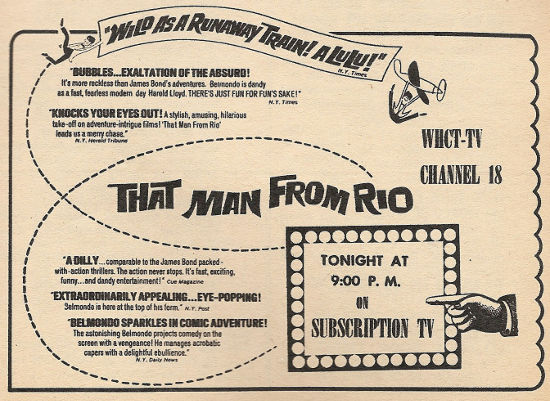
Advertisement for That Man from Rio on WHCT-TV (Channel 18) – Copyright 1965 Triangle Publications, Inc.
And just because, here’s a TV Guide subscription advertisement:
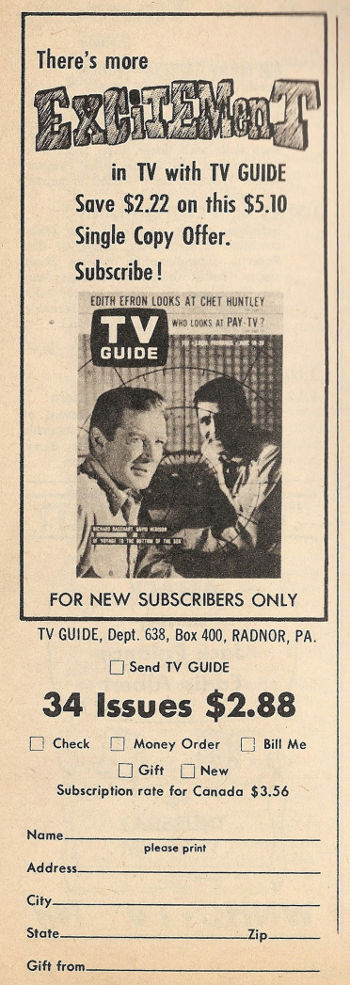
Advertisement for TV Guide subscriptions – Copyright 1965 Triangle Publications, Inc.
Here are the episode descriptions for Dateline Boston, a local series broadcast live and in color Monday through Friday from 6-6:25PM on WHDH-TV (Channel 5):
Monday, June 21st, 1965
Capt. Bob draws with black and colored crayons today.Tuesday, June 22nd, 1965
Songs of the sea and the sea chantey are illustrated.Wednesday, June 23rd, 1965
“Massachusetts Division of Fisheries and Game.”Thursday, June 24th, 1965
A contest of skill in chemistry between science students from Dedham High school and Maynard High School, Walpole.Friday, June 25th, 1965
Students of St. Lawrence University present a concert of spirituals and popular music.
That’s it for this week. Hit the comments with your thoughts.

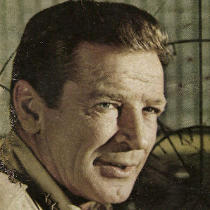
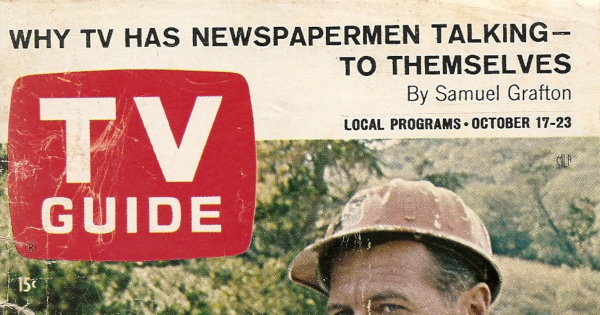
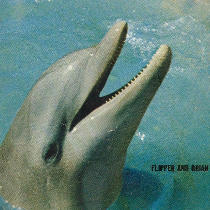
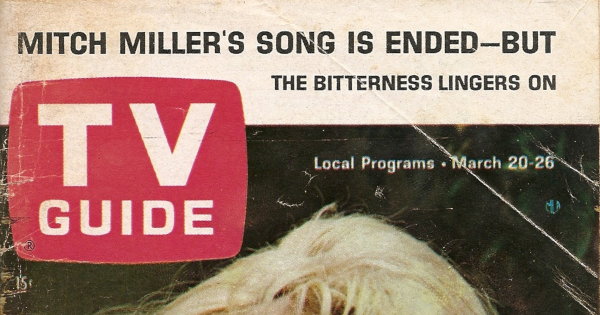



“At 2PM on Friday, June 25th ABC aired the final episode of its soap opera A Flame on the Wind, to be replaced on Monday, June 27th by Where the Action Is.”
Monday was June 28, not June 27, in 1965.
“At 8:30PM, WBZ-TV pre-empted NBC’s The Lawrence Welk Show for an hour-long syndicated special titled “Paintings in the White House” hosted by Lady Bird Johnson.”
Lawrence Welk was on ABC, not NBC, so WHDH or WNAC may have preempted it instead, unless WBZ normally carried it.
Thank you Jon. You said it better than i could. And i believe WNAC (now WHDH) was indeed the ABC station at the time in Boston. Not many channels can say they’ve been affiliated with all of the “Big Three” networks-but Boston’s channel 7 can.
WAST/WNYT, ch. 13, Albany, NY, is another station which has been affiliated with all the Big Three networks. It was affiliated with ABC when it first signed on in 1956 (on ch. 35 at the time), then it moved to CBS when WTEN, ch. 10, went from CBS to ABC in 1978, then finally (at least until today) it switched to NBC when WRGB, one of NBC’s oldest affiliates, went from NBC to CBS in 1981.
WBRC-TV in Birmingham, AL, can top all of these stations, as it’s gone from NBC to CBS to ABC to Fox over its 60+ year history.
Whoops. “Paintings in the White House” was actually a half-hour special and WBZ-TV pre-empted a repeat of NBC’s The Famous Adventures of Mr. Magoo from 8:30-9PM. I got my channel numbers mixed up and was looking at the wrong listing.
ABC’s deal with Major League Baseball that year was set up to avoid blackouts in big league cities.
They had three teams out in the field: Chris Schenkel and Leo Durocher were the first team, Merle Harmon and Jackie Robinson the second, Keith Jackson and Tommy Henrich the third.
Based on your listings, the Cubs-Reds game was probably the main game, and Twins-Yankees the backup; in Chicago, channel 7 would have likely gotten Twins-Yankees (channel 9, the Cubs’s local outlet, would have possession of that game).
The Red Sox game might have been the third ABC game that Saturday (or the second – who knows at this late date?), so local stations would hold the regional rights there.
… or something like that …
Phonevision:
Zenith brought this process to Chicago – in 1951.
I have in hand the February 24, 1951 issue of TV Forecast,
There’s an illustrated three-page article explaining how the system works for its subscribers, who are hooked up via a special phone line to KS2XBS, channel 2 (owned at the time by Zenith for the specific purpose of launching Phonevision).
Subscribers paid per view – one dollar per movie. The films included “The Westerner”, “Lost Horizon”, “Texas”, “Song Of The South”, and some others that were made available to Zenith for the experiment.
The Chicago experiment only lasted a few months; subscribers were hard to come by, and if you’re old enough to remember what TV sets looked like in 1951, you can imagine the technical glitches that abounded back then.
But as you can see, Zenith never completely gave up on the idea …
The Yankees never appeared on any of ABC’s games in 1965 because they were still contractually tied with CBS (their new owners). So in 1965, Dizzy Dean and Pee Wee Reese, were doing a final lame-duck season of their longtime CBS Game of the Week sponsored by Falstaff Beer that strictly featured Yankee games. Of course this could also refer to a telecast by the Yankee announcers on a regional network.
When I read that blurb about Jeannine Riley leaving “Petticoat Junction” it made me look her up on IMDB. As a kid I watched “Petticoat Junction” but I only recall the later seasons, so I wasn’t aware of her version of Billie Jo Bradley. On her Bio I read this:
At the time Hillbilly cast member Bea Benaderet (as Cousin Pearl) had just been given the green light to star in her own bucolic series, Petticoat Junction (1963) playing Kate Bradley, a hotel-owning widow of three beautiful nubile daughters. The flirty role of daughter Billie Jo Bradley was at first given to actress Sharon Tate but when word came out that a Sharon had posed nude in photo shoots, they were forced to dismiss her from the wholesome series (sponsored by Ivory Soap) before scandal and controversy could cause damage. The part was recast and Jeannine assumed the role.
That made me chuckle. Sure, it was the early 60’s but the show, who used the word for women’s underclothing in it’s title, opened each week with three (naked?) beautiful, young girls swimming in the town’s water tower. In a town named HOOTERville. Yeah, that’s wholesome.
I thought the mid-sixties telecasts of he Harvard-Yale Regatta were jointly produced by WBZ and WTIC (now WFSB).
I wonder if ESPN currently televises the event. It’s not too far (about an hour’s drive) from their world headquarters in Bristol; and additionally, I think the course goes past Mohegan Sun, so a camera could be put on top of the hotel there for “aerial” views of the course.
RE: The U.S. Open
65 would be a watershed year, as this was the first single-round per day tournament (Thursday-Sunday), thanks to Ken Venturi’s severe heatstroke during 64’s 36-hole final day. In addition. this would be the last US Open that NBC would cover until 1995, as ABC Sports and the USGA would be together from 1966-1994
And wasn’t 1965 the first time the U.S. Open golf tournament was broadcast in color?